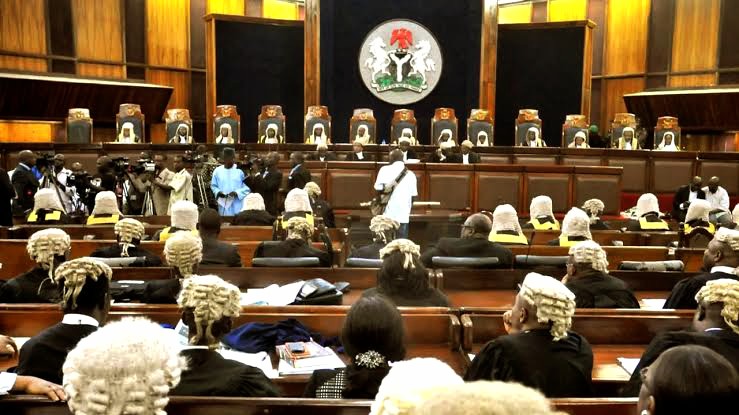
Tribunal Judgment in Nigeria
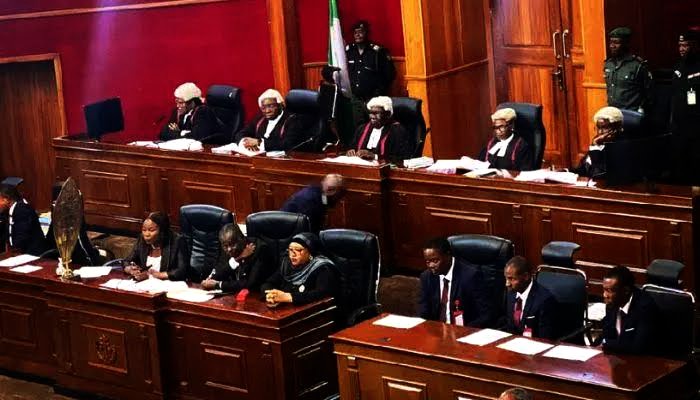
In Nigeria, tribunal judgment play a pivotal role in shaping governance and justice across various sectors. These specialized judicial bodies, established for specific purposes such as electoral disputes or administrative matters, wield significant influence over legal precedents and societal norms. Understanding the complex workings and impacts of tribunal judgment is crucial for comprehending Nigeria’s legal landscape and its broader implications for governance and justice.
Tribunal judgment in Nigeria represent critical milestones in the country’s legal framework. They address complex issues ranging from electoral integrity to administrative fairness. These decisions are rendered by specialized courts outside the traditional judicial system, offering targeted adjudication tailored to specific legal contexts. Consequently, the outcomes of tribunal cases often have far-reaching implications, influencing political processes, public policy, and the rule of law.
Overview of Tribunal Systems in Nigeria
Nigeria’s tribunal systems are diverse, encompassing entities such as election tribunals, tax appeal tribunals, and administrative tribunals. Each tribunal operates under specific laws and regulations designed to provide efficient resolution of disputes within their respective domains. For instance, election tribunals are crucial during electoral cycles, ensuring the fairness and transparency of electoral outcomes.
Role and Function of Tribunal Judgments
Tribunal judgment serve multiple functions within Nigeria’s legal framework. Firstly, they interpret and apply laws relevant to their jurisdiction, clarifying ambiguities and setting legal precedents. Secondly, tribunal decisions contribute to the evolution of Nigerian jurisprudence, shaping future legal interpretations and practices. Moreover, these judgments uphold accountability by holding individuals and institutions responsible for their actions, thereby reinforcing the rule of law.
Impact of Tribunal Judgments on Governance
The impact of tribunal judgment on governance in Nigeria cannot be overstated. By adjudicating disputes related to electoral processes, for example, election tribunals uphold the integrity of democratic institutions. These judgments reinforce public trust in the electoral system and provide a mechanism for resolving disputes fairly and impartially. Furthermore, tribunal decisions influence legislative reforms aimed at strengthening governance structures and improving administrative efficiency.
Case Studies and Analysis
Examining specific tribunal cases provides insight into their significance and implications for Nigerian society. For instance, landmark electoral tribunal cases have shaped political landscapes by either upholding or overturning election results based on legal merits. Similarly, administrative tribunal rulings have streamlined bureaucratic processes, ensuring transparency and accountability in public administration.
Challenges and Criticisms
Despite their critical role, tribunal judgment in Nigeria face challenges and criticisms. Delays in case resolution, procedural complexities, and perceived bias are common concerns that undermine the ability of tribunal systems. Moreover, the enforcement of tribunal decisions and compliance with rulings by relevant stakeholders can pose significant challenges, impacting the overall effectiveness of these judicial bodies.
Future Directions and Reforms
To enhance the effectiveness of tribunal judgment in Nigeria, reforms are essential. Strengthening procedural frameworks, enhancing judicial independence, and investing in judicial capacity-building are crucial steps toward improving the functionality and integrity of tribunal systems. Additionally, leveraging technology to expedite case resolution and promote transparency could mitigate some of the challenges currently faced by tribunals.
Overall
Tribunal judgment in Nigeria constitute a cornerstone of the country’s legal system, providing specialized adjudication that impacts governance, justice, and societal norms. These decisions reflect the evolving dynamics of Nigerian law and contribute to maintaining democratic principles and the rule of law. As Nigeria continues to overcome complex legal challenges, the role of tribunal judgments remains pivotal in shaping a fair, equitable, and accountable society.
Election Tribunal Judgment in Nigeria
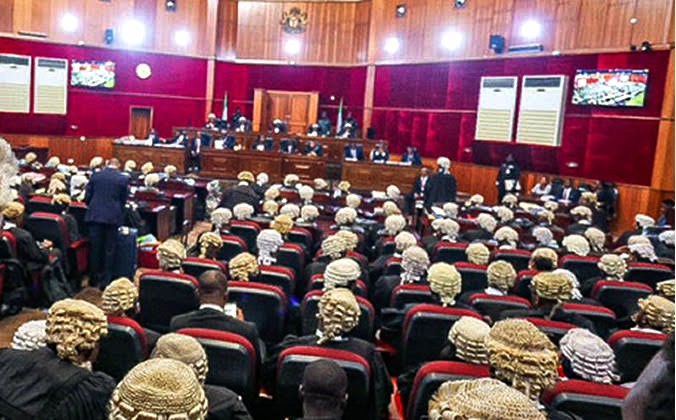
In Nigeria, election tribunals play a vital role in safeguarding the integrity of electoral processes. These tribunals, which adjudicate disputes and ensure fairness, are pivotal in upholding democracy.
Overview of Election Tribunals in Nigeria
Initially established under the Electoral Act, Nigeria’s election tribunals are independent judicial bodies that resolve disputes arising from electoral processes. They play a crucial role in addressing allegations of irregularities, electoral fraud, and challenges to election outcomes.
Legal Framework and Jurisdiction
The Electoral Act of 1999 primarily governs election tribunals in Nigeria. This legislation outlines their jurisdiction, powers, and procedures, ensuring transparency and fairness in the adjudication process. Furthermore, this legal framework provides a solid basis for the functioning of election tribunals across the country.
Types of Cases Handled
Election tribunals in Nigeria handle a wide range of cases, including petitions challenging gubernatorial, senatorial, and presidential election results. These cases often involve allegations of voter intimidation, ballot stuffing, and procedural irregularities. Moreover, the complexity of these cases underscores the importance of thorough adjudication by the tribunals.
Process of Adjudication
The adjudication process before election tribunals typically begins with an aggrieved party filing a petition within a specified timeframe after election results are announced. Tribunals conduct hearings where parties present evidence, call witnesses, and make legal arguments. During these proceedings, the tribunal meticulously examines the evidence presented, ensuring a fair and impartial resolution of disputes.
Significance of Election Tribunal Judgments
The judgments that election tribunals render have significant implications for Nigerian politics and governance. They uphold the credibility of electoral outcomes, set legal precedents for future cases, and contribute to the consolidation of democratic norms. Furthermore, these judgments serve as benchmarks for ensuring accountability within the electoral process.
Challenges Faced by Election Tribunals
Despite their critical role, election tribunals in Nigeria face several challenges. These include delays in the adjudication process, inadequate funding, and sometimes allegations of political interference or bias. Nevertheless, efforts to address these challenges are essential for enhancing the effectiveness and integrity of election tribunals.
Impact on Electoral Integrity
Election tribunal decisions significantly impact electoral integrity in Nigeria. By resolving disputes fairly and transparently, tribunals help maintain public trust in the electoral process and deter electoral malpractice. Consequently, their role in upholding electoral integrity cannot be overstated.
Comparative Analysis with International Standards
Comparing election dispute resolution mechanisms in other countries provides insights into best practices and areas for improvement within Nigeria’s tribunal system. Moreover, international benchmarks can inform reforms aimed at enhancing the efficiency and fairness of election tribunals.
Public Perception and Confidence in Election Tribunals
Public perception of election tribunals is crucial for their legitimacy and effectiveness. Polling data and expert opinions can shed light on public trust levels and factors influencing perceptions. Consequently, fostering greater transparency and accountability can bolster public confidence in the tribunals’ decisions.
Reforms and Future Directions
Proposals for reforming Nigeria’s election tribunal system may include measures to expedite case resolution, enhance tribunal independence, and strengthen mechanisms for monitoring and accountability. These reforms are crucial for adapting to evolving electoral dynamics and ensuring the continued effectiveness of election tribunals.
In essence, election tribunal judgments in Nigeria play a critical role in upholding democracy by ensuring electoral fairness and justice. Despite challenges, these tribunals remain essential for maintaining the integrity of Nigeria’s electoral processes and promoting public confidence in democratic institutions.
Presidential Election Tribunal in Nigeria
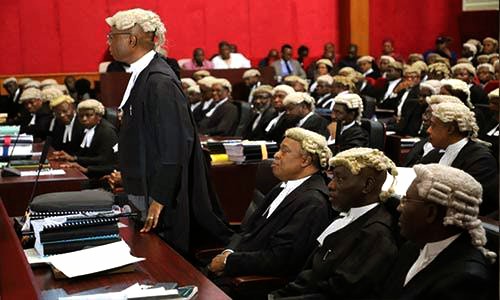
The Presidential Election Tribunal in Nigeria plays a crucial role in Nigeria’s democratic framework by adjudicating disputes arising from the highly consequential presidential elections. This judicial body ensures electoral integrity and upholds the rule of law, reflecting Nigeria’s commitment to democratic governance. This comprehensive analysis examines the structure, function, legal framework, processes, significance, and recent developments of the Presidential Election Tribunal, providing a nuanced understanding of its critical role in Nigerian politics.
Structure and Composition of the Tribunal
The Presidential Election Tribunal typically consists of judges appointed from the judiciary. These judges are selected based on their expertise and impartiality, ensuring fair and transparent adjudication of election disputes. The tribunal’s composition underscores the importance of judicial independence and competence in safeguarding the electoral process against undue influence or bias.
Legal Framework and Jurisdiction
The tribunal operates within Nigerian electoral laws and regulations, which delineate its jurisdiction and procedural rules. It has the authority to hear and determine petitions challenging the outcome of presidential elections. Additionally, it handles allegations of electoral malpractice, irregularities, or violations of electoral laws. This legal framework provides a structured approach to resolving disputes and maintaining the integrity of the electoral process.
Processes and Procedures
The process of adjudicating election petitions before the tribunal is rigorous and meticulously structured. It begins with aggrieved parties filing a petition within a specified timeframe following the declaration of election results. Petitions typically outline specific allegations and evidence of electoral misconduct. Consequently, the tribunal carefully examine these claims through hearings where parties present their arguments and witnesses testify.
Presentation of Evidence and Arguments
Central to the tribunal’s proceedings is the presentation and examination of evidence by both petitioners and respondents. Evidence may include witness testimony, documentary evidence such as electoral records and polling data, and expert opinions on electoral procedures. The tribunal assesses the credibility and relevance of each piece of evidence. Therefore, ensuring a thorough examination of allegations raised in the petitions.
Judicial Deliberation and Decision-Making
Following the presentation of evidence and arguments, the tribunal engages in judicial deliberation to assess the merits of each petition. Judges weigh the evidence against legal standards and precedents, considering the implications for electoral fairness and constitutional principles. This deliberative process underscores the tribunal’s role in interpreting and applying electoral laws to uphold democratic norms and principles of justice.
Significance of Tribunal Decisions
The decisions the Presidential Election Tribunal renders hold significant implications for Nigerian democracy and governance. They validate or invalidate election results, determine the legitimacy of elected officials, and uphold the rule of law in electoral processes. Consequently, tribunal decisions contribute to political stability by resolving disputes peacefully. Therefore, ensuring that electoral outcomes reflect the will of the electorate and reinforcing public trust in democratic institutions.
Challenges and Controversies
Despite its critical role, the Presidential Election Tribunal faces challenges and controversies that impact its effectiveness and credibility. Issues such as delays in adjudication, allegations of judicial bias or manipulation, and the complexity of legal proceedings can undermine public confidence in the tribunal’s decisions. Addressing these challenges requires reforms aimed at enhancing transparency, efficiency, and accountability within the electoral dispute resolution process.
Recent Developments and Case Studies
Recent presidential election tribunals in Nigeria have been pivotal in shaping the country’s political landscape. Notably, cases have included petitions alleging widespread electoral irregularities. Consequently, these cases have tested the tribunal’s capacity to uphold electoral integrity. Case studies highlight the tribunal’s role in resolving contentious election disputes. Additionally, they illustrate its impact on national political dynamics, thereby demonstrating its influence on governance and democratic stability.
Overall
The Presidential Election Tribunal in Nigeria serves as a vital institution for resolving electoral disputes and upholding democratic principles. Its structure, legal framework, processes, and decisions are instrumental in safeguarding electoral integrity and ensuring that elections are conducted fairly and transparently. Despite challenges, the tribunal plays a crucial role in promoting political stability and advancing democratic governance in Nigeria. As the country continues to overcome electoral challenges, the tribunal’s role remains indispensable in shaping the future of Nigerian democracy.
2023 Presidential Election Tribunal Judgment in Nigeria
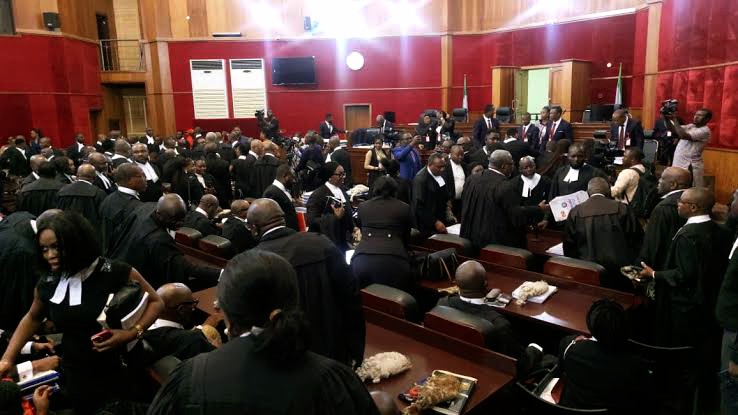
In a landmark decision on Wednesday, September 6th 2023, Nigeria’s presidential election petitions tribunal confirmed Bola Tinubu as the duly elected president of the Federal Republic of Nigeria following the February 25th election. The tribunal, comprising five esteemed jurists, meticulously reviewed three petitions challenging the election’s outcome, marking a significant moment in Nigerian political history.
Background and Legal Challenges
The February election, characterized by high voter turnout and intense campaigning, culminated in Tinubu’s victory amid allegations of electoral irregularities. Promptly, opposition parties lodged three petitions with the tribunal, alleging voter suppression, procedural flaws, and electoral malpractice.
Tribunal Proceedings and Decisions
Going through weeks of hearings, the tribunal carefully examined evidence presented by petitioners and Tinubu’s legal team. Ultimately, the panel unanimously dismissed all petitions, citing lack of substantial evidence to overturn the election results.
Implications and National Response
The tribunal’s ruling sparked diverse reactions nationwide. Supporters of President Tinubu celebrated, while opposition voices expressed disappointment. Consequently, transitioning from jubilation to calls for electoral reform, the verdict underscored the judiciary’s pivotal role in safeguarding democratic principles and electoral integrity.
Future Challenges and Prospects
Looking ahead, President Tinubu faces the task of governing amidst heightened expectations and pressing national issues. Meanwhile, moving from electoral victory to governance, his administration must tackle economic reforms, security challenges, and social welfare initiatives.
In essence, the tribunal’s affirmation of Bola Tinubu’s presidency signifies a milestone in Nigerian democracy. Transitioning from a contested election to judicial scrutiny, the decision underscores the judiciary’s commitment to upholding the rule of law. Consequently, Nigeria stands at a crossroads, poised to address critical issues under Tinubu’s leadership, guided by the tribunal’s pivotal ruling.
Click to get more news and latest updates on court cases in Nigeria
Related Topics
Cubana Chief Priest Naira Abuse Trial At Lagos Court
Court Orders Remand of Ex-CBN Governor Emefiele Amid Allegations of Office Abuse
Bobrisky Pleads Guilty: Nigerian Cross-Dresser Admits Naira Abuse Charges in Court
Arraignment of Binance Executive Delayed as Court Adjourns Trial


